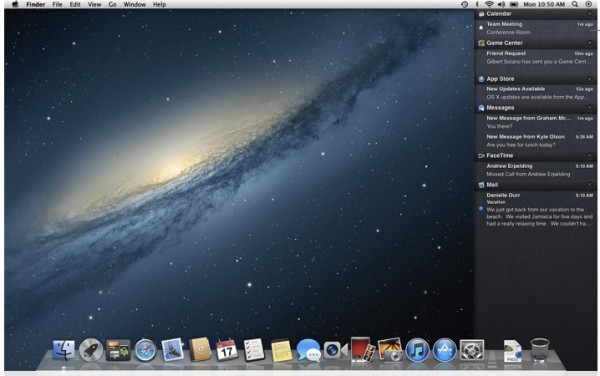Why should I, a Windows user, care about Mountain Lion anyway?

As it has been widely reported today, Apple released its latest desktop operating system, OS X 10.8 (Mountain Lion) to the public. The operating system costs just $20 to download through the Mac app store, and is available to all current Mac users running OS X 10.6 or higher.
But you are a Windows user with no intention of switching over to Mac OS. If you bought a Mac you'd, probably boot Windows on it. You really have no place for Mountain Lion in your heart or mind, so what could anyone possibly say about it that would make you nod your head in agreement that a feature is cool or signifies one trend or another?
Let's see if I can at least raise your eyebrows or make you scratch your head. I tend to think of myself as a "general computer user" rather than an OS-specific entity, and there are a couple of things about Mountain Lion that fall into my "noteworthy" bin about OS evolution.
Convergence is a bit more gradual in OS X
The difference between "mobile" and "desktop" operating systems grows even smaller as Apple incrementally adds iOS features to OS X.
Apple's Marketing SVP Phil Schiller openly proclaimed the iPad was inspiring Mac OS development last year when OS X Lion debuted, including, most notably the "Launchpad" app menu.
In Mountain Lion, there's now a mobile-inspired notification center along the top of the screen, where calendar invites, app updates, and general alerts appear as they roll in. It is executed in a fashion not unlike Ubuntu's pop-up notification system.
Additionally, Apple has included Game Center in Mountain Lion, which is a social gaming hub where users can check leaderboards, achievements, and invite other users to play games. Game Center debuted in iOS 4 around two years ago.
Apple's convergence path is actually much more conservative than Microsoft's has been. In Windows 8, Microsoft will take a huge plunge into the touch-based "Metro" interface and gamble on a new style of tablet/notebook computing with Surface. Meanwhile, in OS X 10.8, it's still mostly the same interface, just with more mobile-style features thrown in.
Sharing everything with everything [Apple] is the future
This is a different type of convergence. This is the convergence of content which will eventually make everything available everywhere. Mountain Lion includes a "share to" feature in a number of its system apps, such as Preview and Safari. By clicking the share button, users will be able to send content (photos, videos, links, or documents) to their email client, to the new message center, to AirDrop file sharing, to Twitter, Vimeo, Facebook, and other social networks.
But when it comes to sharing content with other devices, Apple continues to act like a protective gatekeeper.
Mountain Lion includes AirPlay mirroring which allows users to share their Mac screen with their HDTV. Of course, to do that, they have to puchase a $99 Apple TV. But when they have one, they can essentially use any size HDTV as a wireless monitor. If you're like me, you've entertained the idea of hanging a 52" HDTV in front of your desk to use it as a giant, theater quality monitor for your daily computing tasks. Heck, maybe you've even done it. Mac users now have that option packed into their OS, and wireless detection of Apple TVs is automatic.
Pardon the pun, but not everything is strictly Apples-to-Apples. The new desktop iMessage application lets users communicate in an encrypted BlackBerry Messenger-like fashion with iPhones, iPads, and iPod touches with iOS 5 or later, as well as with other Mountain Lion-equipped Macs. It includes group messaging, video chat, support for various instant messaging clients between Apple devices, but it includes the ability to send messages to phone numbers and email addresses not associated with an Apple ID.
China is a strong PC growth market
With this OS update, Apple has included a whole set of upgrades geared specifically toward the Chinese market. Much of this is based upon language, including an improved handwriting recognition engine that recognizes nearly 30,000 characters, new Chinese fonts, fuzzy Pinyin text input that can better recognize regional spellings and pronunciations, and multi-language typing that recognizes Pinyin and English words in a single keyboard.
But language isn't all, China's Mountain Lion package is integrated with the most popular Chinese web services like Baidu for search, Sina Weibo for microblogging, Youku and Tudou for video sharing and uploading, and QQ Mail and 126 for e-mail.
Early in 2012, it was shown that Apple's total sales were increasing globally, but sales were disproportionately faster in China. In North America, Mac sales increased by 25 percent, while in China they grew a whopping 76 percent.
Catering to the Chinese market is, while growth rates remain high, a major priority.